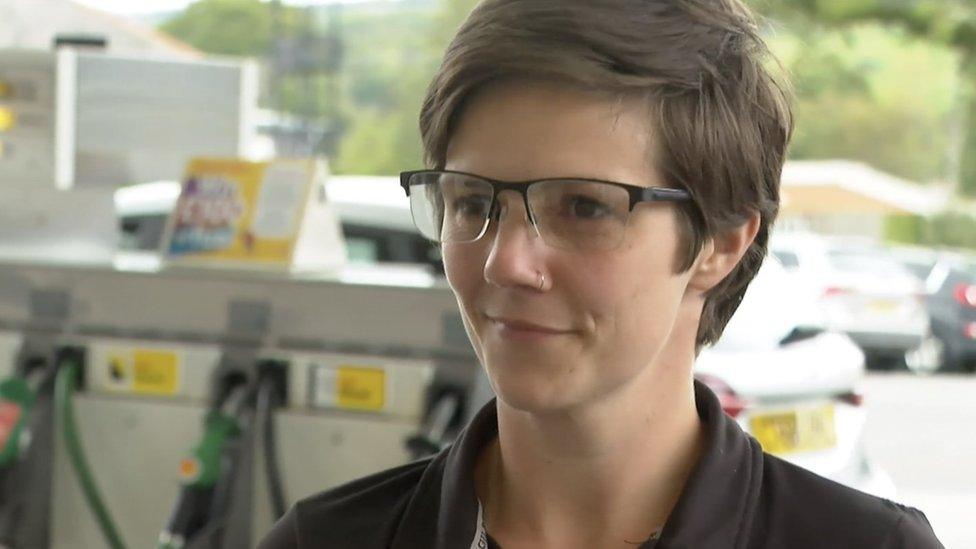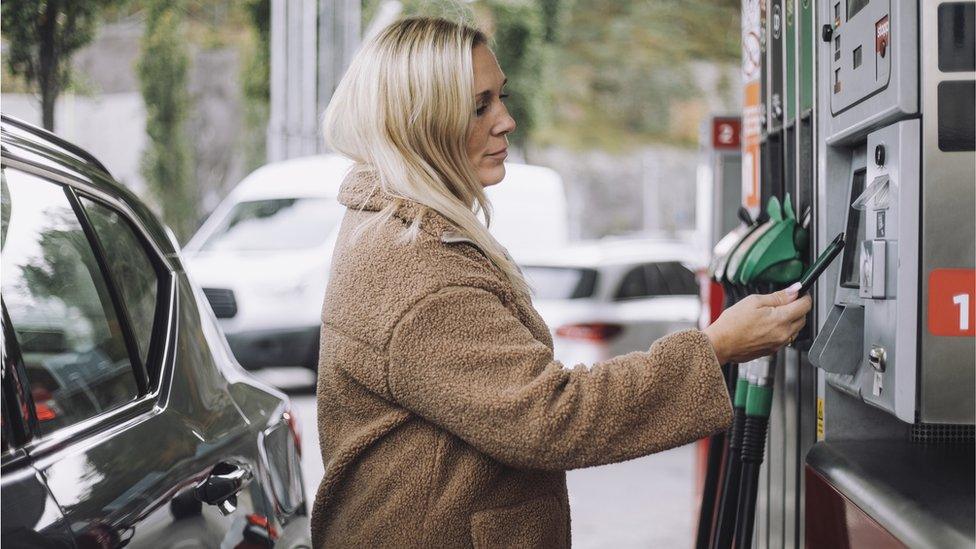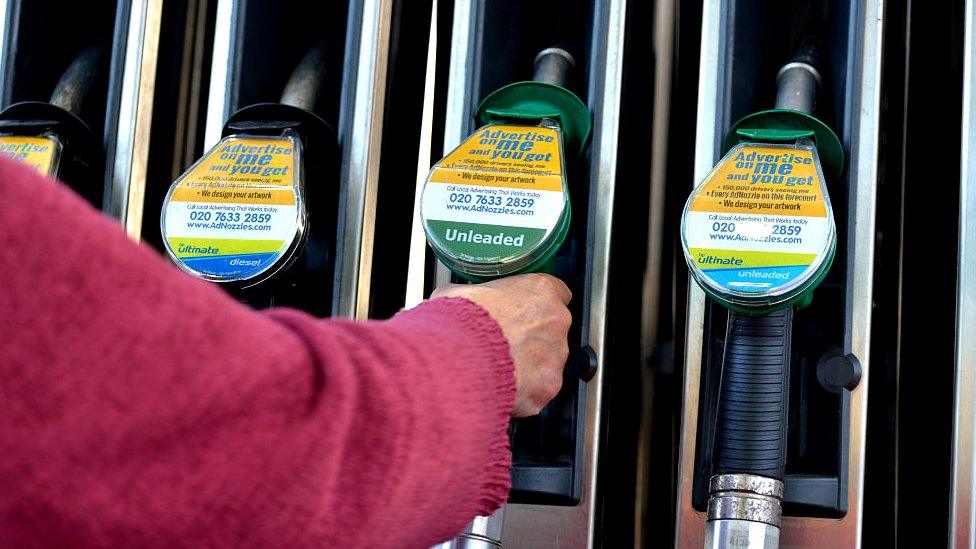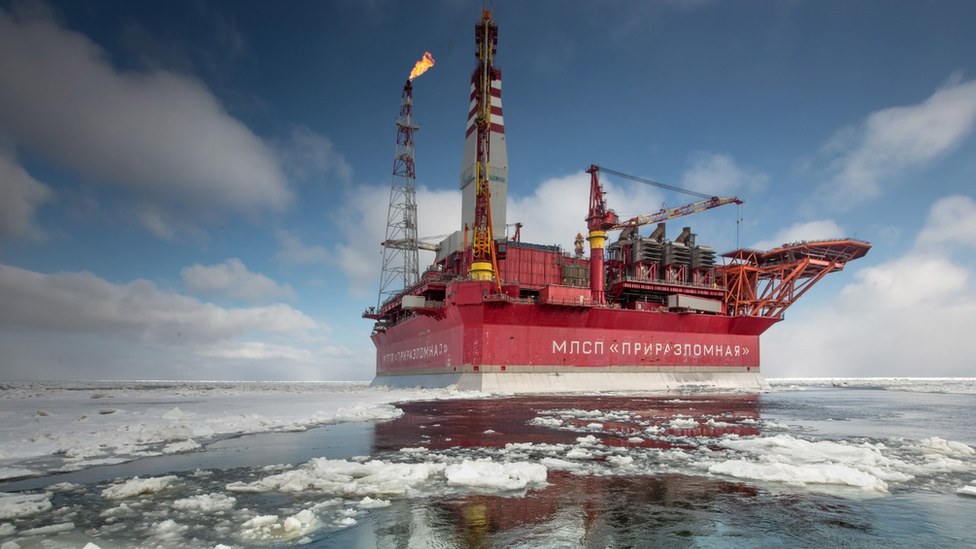Fuel price rise concerns after oil hits 10-month high
- Published
- comments

Annie Davies says she has to ask herself whether she can afford to fill up her car
Filling up her tank with diesel, Annie Davies said she wished she had done it a day earlier when it was 4p cheaper per litre.
The mother, from Llandysul, Ceredigion, said she has been unable to take her children on day trips because of the recent fuel price increases.
Global oil prices are at their highest level in 10 months, with UK drivers paying £1.59 per litre for diesel.
Analysts warned the rising prices could have an impact on inflation.
However, new figures show core inflation was 6.2% in the 12 months to August 2023, down from 6.9% in July.
Ms Davies saves on fuel by working from home sometimes, but said living in a rural area meant having to travel longer distances to fill up her tank.
Diesel is more expensive at her local garage compared to the nearest supermarket, but she has to weigh up whether it is worth travelling 20 miles (32km) to get fuel at a slightly lower price.
"I have to balance up that cost - can I afford to do it or not? Everything feels like it's always going up and you're getting a lot less for your money," she said.
"Unfortunately it has meant that I'm less able to support local businesses and shop locally - I have to go where the cheaper offers are.
"It does affect your standards of living as well, having to choose less healthy options, food-wise.
"I don't really want to feed [my children] chicken nuggets every day, but when you look at what the affordable option is then it does make a difference."
Latest figures show UK drivers are now paying £1.55 on average per litre of petrol, with diesel at £1.59.

Sion Jones, who runs Valley Services fuel station, said independent garages were struggling to compete
Sion Jones, manager at Valley Services fuel station in Llandysul, blamed high fuel wholesale prices and said independent businesses were struggling to compete with supermarkets.
"You have to be competitive. As things are, we keep the price of one up and the other down so we're not at a loss," he said.
"Perhaps unleaded will come in cheaper than what we advertise and diesel will be more expensive so maybe we'll increase our price for unleaded.
"We just can't sell it at a loss otherwise it's pointless opening our doors."

Why are fuel prices rising?
Following Russia's invasion of Ukraine in February 2022, oil prices soared, hitting more than $120 a barrel in June last year.
They fell back to a little above $70 a barrel in May this year, but have steadily risen since then as producers have tried to restrict output to support the market.
Saudi Arabia and Russia, two of the world's largest oil-producing nations, decided to reduce production earlier in August.
At the same time, the US Energy Information Administration said on Monday that US oil output from its top shale-producing regions was set to decline in October for the third straight month, reaching its lowest level since May.

Economist at Bangor University, Dr Edward Jones, said it was difficult to predict what could happen next.
"Saudi Arabia and Russia have recently cut their production. The relationship between the Middle East and the United States along with China, I believe, also has a bearing," he said.
"Geo-political decisions will continue to have a big influence on the changes in prices at the pumps."
The RAC accused retailers of taking bigger margins than normal at the pumps.
"If they were playing fair with drivers, they would be reducing their prices rather than putting them up," the RAC's fuel spokesman, Simon Davies, said.
The Petrol Retailers Association has been approached for comment.

CROSSBOW KILLER: Investigating the case of a Welsh murder stranger than fiction
ACID DREAM: How a Welsh farmhouse sparked a revolution of the mind

Related topics
- Published19 September 2023

- Published14 August 2023

- Published5 June 2023
